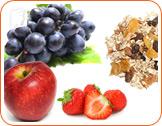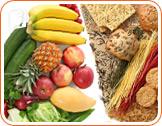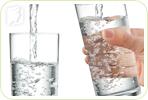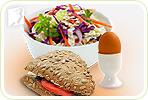
When fruits, vegetables, and grains are consumed, the digestive system breaks down most of their parts. However, the body cannot break down the cellulose found in the cell walls of plants, so these components remain intact throughout digestion. These cell walls make up a large part of dietary fiber and act like a broom in the intestines, sweeping along all of the waste that needs to be excreted.

Fiber is divided into two different types — soluble and insoluble. Soluble fiber allows your stool to absorb more water, making it more voluminous and softer. Insoluble fiber contributes more weight to the stool, allowing it to pass through your digestive system quicker.
What Foods Can I Eat to Increase My Daily Fiber?

To begin, you should know how much fiber is recommended for your daily diet. Suggestions from the American Dietetic Association advise women from the ages of 19 - 50 to consume about 25 grams of fiber daily, and women 50 or over should get about 21 grams each day. Studies show that Westerners tend to get about half the recommended amount of fiber each day, which can lead to long-term health issues, particularly digestive problems.
Generally speaking, foods that grow from the ground are usually high in fiber. Increasing the amount of fruits, vegetables, beans, legumes, and whole grains you eat will help you to reach the right level of fiber intake. Dietary fiber rich foods include:
- Vegetables like broccoli, carrots, artichokes, and potatoes skins
- Fruits like pears, citrus fruits, and berries
- Whole grains like brown rice, quinoa, and whole wheat bread and pasta
- Nuts like peanuts, almonds, sunflower seeds, and pecans
- Legumes and beans like lentils, split peas, black beans, kidney beans, and garbanzos

Increasing your intake in each of these groups at once might seem a bit daunting, but there are easy ways to make sure you're packing enough fiber into your diet. Include fresh fruit in desserts, and switch out French fries for a baked potato topped with broccoli or salsa, for example.
Eating a breakfast cereal with at least 10 grams of fiber per serving every morning can help you consume almost half of your daily goal. Try to snack on fresh fruits, vegetables, and nuts when you get hungry throughout the day, and make sure a fiber-rich food is incorporated into most of your meals.
More Information about Digestive Problems
In addition to what you eat, constipation could be caused by how you eat it. Be sure to chew foods thoroughly when you eat and drink enough water. Adding lots of fiber-rich foods to your diet suddenly can cause your body to react by becoming gassy and bloated. You can help combat this by allowing your body time to adjust to new foods. Stress and other medical conditions can also cause constipation. Click on the following link to learn more about avoiding digestive problems.
Sources
- Mayo Clinic Staff. (2015). Dietary fiber: Essential for a healthy diet. Retrieved October 27, 2015, from http://www.mayoclinic.org/healthy-lifestyle/nutrition-and-healthy-eating/in-depth/fiber/art-20043983
- National Health Service UK. (2015). Why is fibre important? Retrieved October 27, 2015, from http://www.nhs.uk/chq/pages/1141.aspx?categoryid=51


